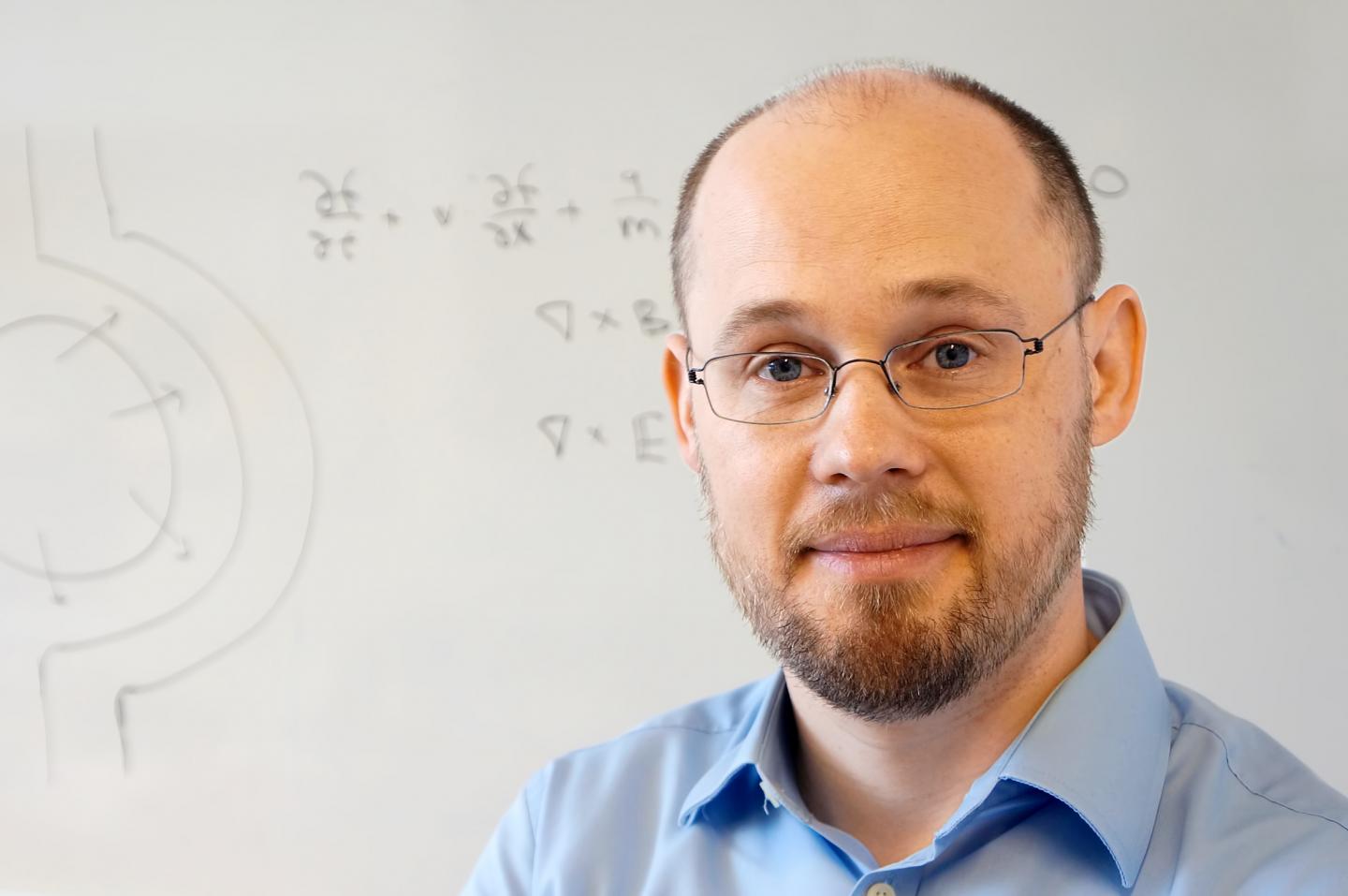
Credit: Sarah Jane White
Leadership of laboratory experiments that bring astrophysical processes down to Earth has won physicist Will Fox the 2019 Thomas H. Stix Award. The American Physical Society (APS) honor, which recognizes outstanding early career contributions to plasma physics, was established in 2013 in the name of the late Thomas H. Stix, the pioneering plasma researcher who founded the graduate plasma physics program at the U.S. Department of Energy’s (DOE) Princeton Plasma Physics Laboratory (PPPL).
Original and seminal experiments
The award cites Fox, “For original and seminal experiments, supported by simulations, on magnetic reconnection, the ion Weibel instability, and shocks in laboratory astrophysics.” The ion Weibel instability generates magnetic fields that play an important role in astrophysical processes.
“I am certainly grateful to the APS for this recognition,” said Fox, who earned his doctorate from the Massachusetts Institute of Technology (MIT) in 2009 and joined PPPL in 2013. “I also have gratitude to all the people I work with at PPPL, which is a very collaborative place.”
The award, which Fox will receive at the annual meeting of the APS Division of Plasma Physics in October, consists of $3,000 and a certificate citing his contributions. The recognition marks the second Stix award for a PPPL scientist in its six-year history. Physicist Ilya Dodin received the first honor in 2014.
Plasma, the state of matter composed of free electrons and atomic nuclei, or ions, comprises 99 percent of the visible universe and fuels fusion reactions that power the sun and most stars. Laboratory experiments create “reproducible and controlled study of plasma phenomena, which are difficult to study in the cosmos due to the limits of remote sensing,” Fox said.
Accelerate plasma particles
His work investigates the plasma processes that accelerate plasma particles to enormous energies in the cosmos. For example, shocks that form in exploding supernova may accelerate cosmic rays to speeds approaching that of light. And magnetic reconnection — the separation and explosive snapping together of magnetic field lines – may cause the huge release of energy in solar flares.
Fox combines research on the Magnetic Research Experiment (MRX) at PPPL and laser facilities at other laboratories with computer simulations. “Compared with pure theory and simulation, laboratory experiments are essential to demonstrate that models of astrophysical processes are grounded in reality,” he said.
Much of his research uses laser-produced plasmas to explore astrophysical processes. His findings include the first experimental observation of the ion Weibel instability and explorations of rapid magnetic reconnection. “Will has performed ground-breaking research on laser-produced reconnection plasma physics,” said Jon Menard, PPPL deputy director for research, “and this award is well deserved.”
World’s most powerful lasers
Fox and colleagues have conducted plasma research at the OMEGA Laser Facility at the Laboratory for Laser Energetics at the University of Rochester, and with the world’s most powerful lasers at the National Ignition Facility (NIF) at the Lawrence Livermore National Laboratory. Subsequent NIF experiments are scheduled for this fall. “I appreciate the work of my great colleagues at these facilities to make these experiments happen,” he said.
Fox developed his career-long interest in plasma physics as an undergraduate at Princeton University, where PPPL physicist Hantao Ji advised his senior thesis. While at Princeton, Fox spent a summer studying plasma with a National Undergraduate Fellowship — now called a Science Undergraduate Laboratory Internship (SULI) — at General Atomics in San Diego. In 2009 he joined the University of New Hampshire (UNH) as a research scientist and collaborated with Amitava Bhattacharjee, then a UNH professor and now head of the PPPL Theory Department.
Looking back over his work, Fox says that exploring plasma physics has brought together his experimental and theoretical interests. “In the process of doing all these laser plasma experiments, my colleagues and I have developed new ways of doing simulations that accompany them,” he said. “There’s a great relationship between theory and experiment at PPPL and theory is really important. It makes you think about the big picture and the important questions to focus on.”
###
PPPL, on Princeton University’s Forrestal Campus in Plainsboro, N.J., is devoted to creating new knowledge about the physics of plasmas — ultra-hot, charged gases — and to developing practical solutions for the creation of fusion energy. The Laboratory is managed by the University for the U.S. Department of Energy’s Office of Science, which is the single largest supporter of basic research in the physical sciences in the United States and is working to address some of the most pressing challenges of our time. For more information, visit energy.gov/science (link is external).
Media Contact
John Greenwald
[email protected]
Original Source
https:/



